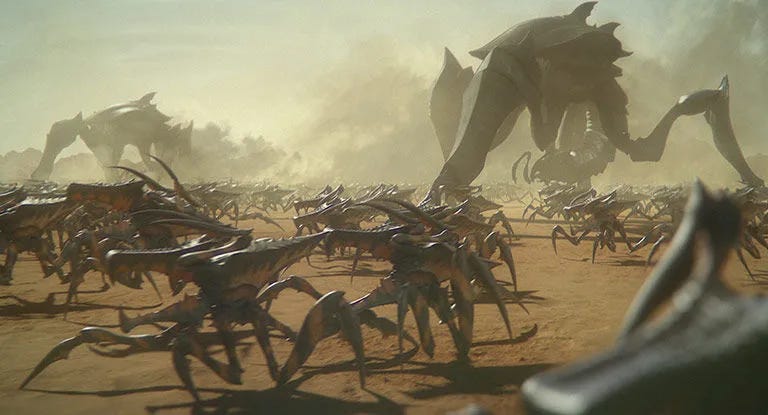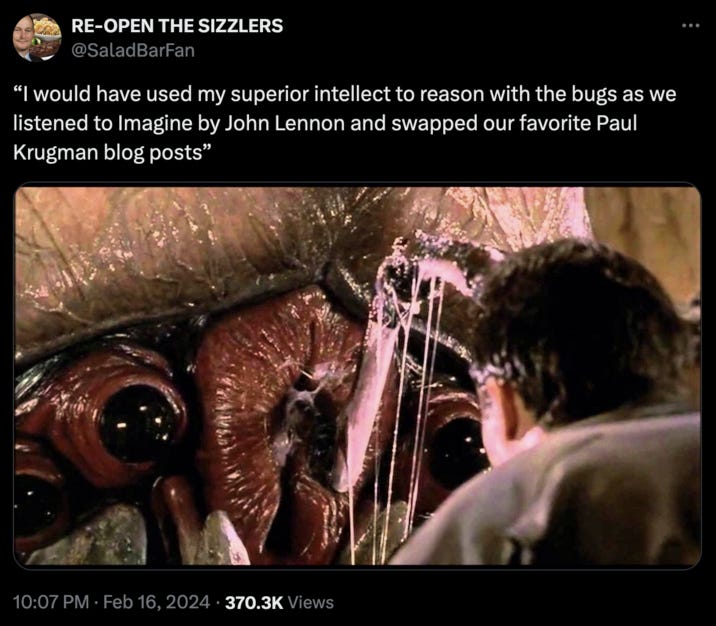"I'm Something of a Genocidal Space Bug Myself"
On the “Starship Troopers Discourse” and society’s inability to consume story
I know I’m late to the party here, but when my husband told me one evening several months ago that Starship Troopers—of all things—had reentered the public discourse with such steaming hot takes as, “Bro, it doesn’t matter that they’re literally a soulless hivemind, it’s actually deeper than that, bro, really, the bugs deserve empathy; I mean, c’mon bro, have you seen the costumes the humans wear?” I was truly astonished. Leftists self-identifying as genocidal space bugs wasn’t on my bingo card.
And honestly, I’m not really here to talk about Starship Troopers. The memes were great, but the discourse has moved on. My reason for bringing it up now is because I think it says a lot about the state of modern society and our inability to consume stories without synthesizing them down to themes such as “1930s German aesthetics bad, ergo giant killer bugs good!” Starship Troopers isn’t even a serious movie, but you can always trust leftists to spin unserious things into Super-Serious-Matters (don’t you dare laugh, you disgusting space-Nazi!), so I guess I shouldn’t have been as surprised as I was by any of this.
This problem of filtering a story’s theme through the narcissistic mind of the “modern audience” extends to nearly all commercial fiction currently being produced or consumed. This worldview is so simplistic, believing that everything must be represented in harsh contrasts: black-and-white goodies and baddies—and, of course, insisting that everything within a story’s framework adhere to the Current Standards of what is allowed by the censors to be portrayed as good and evil. There can be no room for error! Even the slightest misstep puts at risk your reputation at least, possibly even your livelihood and safety. Best just to make absolutely certain nobody could possibly come away from a story like Starship Troopers thinking German uniforms are sexy.
The problem with this attempt to distill all stories into current political propaganda is that: “[…] art is the most unnatural minion of the state. Not only is it created by fanciful people who tire of repetition even more quickly than they tire of begin told what to do, it is also vexingly ambiguous. Just when a carefully crafted bit of dialogue is about to deliver a crystal-clear message, a hint of sarcasm or the raising of an eyebrow can spoil the entire effect. In fact, it can give credence to a notion that it is the exact opposite of that which was intended. So, perhaps it is understandable that governing authorities are bound to reconsider their artistic preferences every now and then, if for no other reason than to keep themselves fit.” – A Gentleman in Moscow [on film]
You see, story is not in high demand these days. Propaganda is. And if a story fails to present the correct propaganda, well, straight to jail, right away! This is one of the many reasons old works must be remade in the modern image. It’s bad enough if you’ve got story first and propaganda second; it’s a shameful failure to have a story absent of propaganda altogether, and the most blasphemous and unforgivable of sins to have a story that could possibly be construed as a portrayal of the wrong propaganda.
What the Starship Troopers discourse demonstrated is not simply the inability of Modernity to produce new stories, but the inability even to consume existing stories without twisting them to suit the political needs of the leftist worldview. If you’re a thinking person, you can see the damage this does to art, and, by extension, to society.





I think this just answered a question some of us were discussing yesterday. Thanks!
Just came across this post (late) via Substack reads. A positive note.....Your pessimism about hive-mind art is basically warranted but as I wrote in this post https://grahamcunningham.substack.com/p/art-will-keep-us-alive there are still stories being told:
"Certainly the Arts & Media establishment is 90+% Left. This is most regularly brought home to me in the murder mystery tv drama serials that my wife and I tend to relax to in the evening. The quality of the acting varies but the basics of the plot lines almost never do. The scripts follow a virtue-signalling tick-box formula that I wrote about in this piece. A much more productive way of spending my evenings is in reading novels - both classic and contemporary. I always have at least one on the go and am constantly surprised at how plentiful is the supply of quality literary fiction even in Wokefied 2024. No doubt there are novels full of the same kind of race guilt-trip, LGTBXYZ and gender blah blah that is inescapable on the tv but I find no difficulty in avoiding them. Whilst I do not actively delve into the novelists’ politics, my sense is that most of the contemporary – and indeed classical – novelists I read are Progressive-leaning. But this does not prevent them from conceiving stories full of perception and wisdom about our human condition."